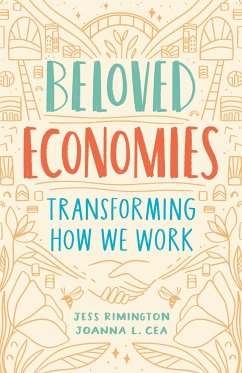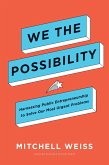Beloved Economies defines what it takes to co-create US economic futures that work for all.
From rising inequality, to systemized oppression, and an increasing consolidation of wealth, it's clear that work isn't working for us anymore. Rather, it's working for a select few. What changes can we implement at all levels of organizations, now, to make them healthier and more just?
Based on five years of data, Beloved Economies offers seven practices for individuals who are part of teams within enterprises-from businesses to nonprofits, farms, and after-school groups-to build economic realities of more purpose, meaning, and joy. These seven practices are:
-Choose Trust
-Share Power
-Reckon with History
-Prioritize Relationships
-Seek Meaningful Difference
-Source from Multiple Ways of Knowing
-Prototype Early and Often
In their work with a range of communities and leading voices across the United States who are building the next economy, researchers Jess Rimington and Joanna Cea have found that when individuals commit to these practices, they transform their enterprises to be "less capitalist" and more of an emerging system that expands economic imagination. Those working in this way awaken to the fact that our economies are not distant, abstract and cold forces acting upon us, enabling us to survive. Rather, our economies can be about mutual cooperation and should exist to facilitate our need to thrive.
Beloved Economies shows that work is not just a source of meaning or income, nor that the "best work" must be restricted to some rather than others. Large-scale change does not require a policy prescription or a degree in economics, just a commitment to show up every day with a vision for a better tomorrow. Rimington and Cea show that work can work for us all, and we can build an economic future that we can all love.
From rising inequality, to systemized oppression, and an increasing consolidation of wealth, it's clear that work isn't working for us anymore. Rather, it's working for a select few. What changes can we implement at all levels of organizations, now, to make them healthier and more just?
Based on five years of data, Beloved Economies offers seven practices for individuals who are part of teams within enterprises-from businesses to nonprofits, farms, and after-school groups-to build economic realities of more purpose, meaning, and joy. These seven practices are:
-Choose Trust
-Share Power
-Reckon with History
-Prioritize Relationships
-Seek Meaningful Difference
-Source from Multiple Ways of Knowing
-Prototype Early and Often
In their work with a range of communities and leading voices across the United States who are building the next economy, researchers Jess Rimington and Joanna Cea have found that when individuals commit to these practices, they transform their enterprises to be "less capitalist" and more of an emerging system that expands economic imagination. Those working in this way awaken to the fact that our economies are not distant, abstract and cold forces acting upon us, enabling us to survive. Rather, our economies can be about mutual cooperation and should exist to facilitate our need to thrive.
Beloved Economies shows that work is not just a source of meaning or income, nor that the "best work" must be restricted to some rather than others. Large-scale change does not require a policy prescription or a degree in economics, just a commitment to show up every day with a vision for a better tomorrow. Rimington and Cea show that work can work for us all, and we can build an economic future that we can all love.









